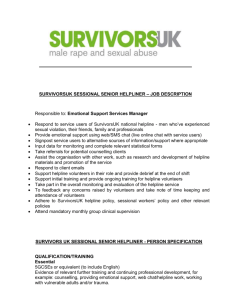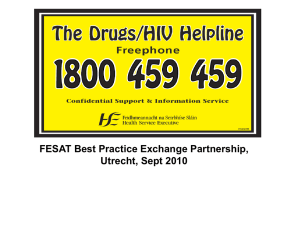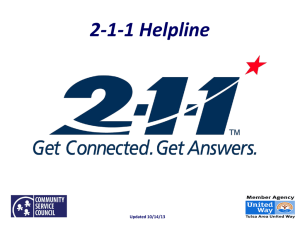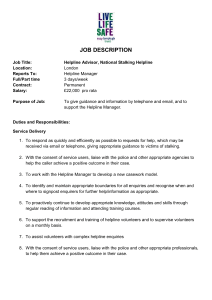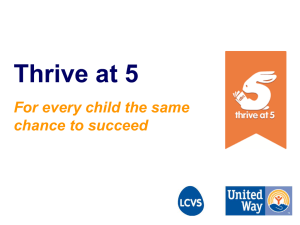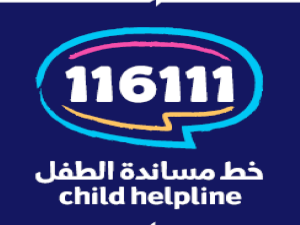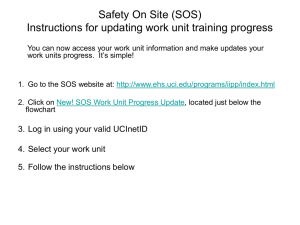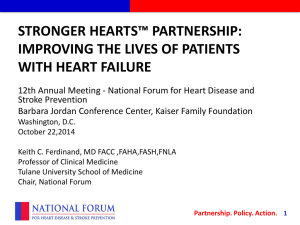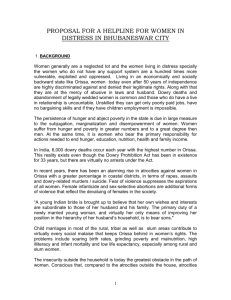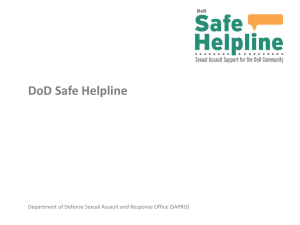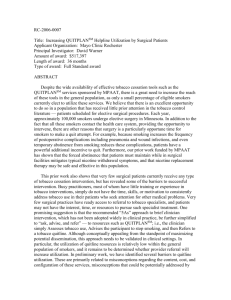PRESENTATION OF THE OKANA DRUGHELPLINE SOS 1031
advertisement
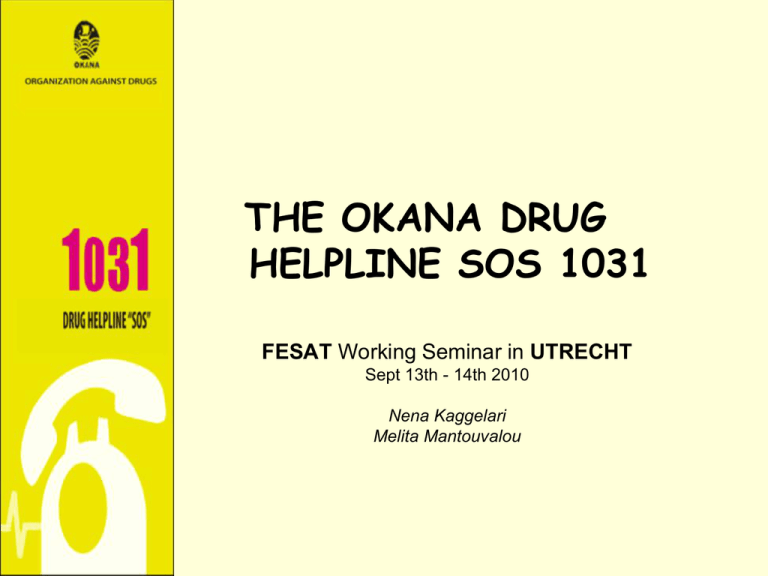
THE OKANA DRUG HELPLINE SOS 1031 FESAT Working Seminar in UTRECHT Sept 13th - 14th 2010 Nena Kaggelari Melita Mantouvalou OKANA (ORGANIZATION AGAINST DRUGS) The Organization Against Drugs (OKANA) was established by Law 2161/93 and operates since 1995 in Greece Main Goals of OKANA Design, promote & coordinate a national policy on prevention, treatment and rehabilitation in the field of substance abuse. Study the phenomenon of drugs at a national level, & provide information and help to the public. Create & develop municipal Prevention Centers, Therapeutic Programs & Centers of Social and Professional Rehabilitation. Networking o o o o o Ministry of Public Health Therapeutic programs Local government Universities European and International Organizations OKANA has developed an extensive network of Prevention Centers all over Greece, in cooperation with local municipality. It has also created various programs covering Treatment and Social Rehabilitation of drug users. OKANA’s SERVICES 1. Prevention: 71 Prevention Centers operate all over the country in cooperation with Local government. 2. Treatment : 1 Admission, Information and Orientation Center 24 Therapeutic Substitution Units, 3 Adult Drug Free Programs 4 Young people Drug Free Programs 3. Social Rehabilitation: 1 Social Rehabilitation Unit 1 Vocational Training Center (in Athens and Thessalonica). 4. Direct Services 1 Emergency Care and Support Unit 1 Day Care Center for Drug Addicts 1 Telephone Drug Helpline SOS 1031 5. Support Services Administrative support services Overview of the Drug Helpline SOS 1031 • Started in 2000. Covers the whole country as a low call service (free of charge for Vodafone users). Anonymity and confidentially of callers is ensured. Staff includes 5 mental health professionals: a manager, 4 counselors, and an administrative secretary (no volunteers at the present moment). Opening hours: Monday-Friday 8:00-20:00. GOALS OF THE HELPLINE Information, support & guidance for all those concerned with any aspect of substance misuse: legal & illegal drugs, alcohol, tobacco, etc. Counseling for motivational purposes and emotional support Emergency help & advice in case of a crisis (withdrawal period, etc.) Referrals to services for treatment & prevention Advice on mental health & emotional support resources The OKANA DRUG HELPLINE SOS 1031 RESPONDS TO: The needs of people, directly or indirectly involved with drug abuse Specifically: Drug users Parents-siblings and relatives Friends-Partners Social workers-Health care professionalsEducators - Students-Employers Media-Police -Public at large. CALLER’ S REQUESTS Information about drugs. Therapeutic or prevention programs. Help to handle an emergency crisis. Psychological guidance & support. Technology & Reporting Call details are registered daily in a computerized database program (Access) Call records are collected on a monthly basis & processed by the helpline team Statistics are used for Okana & for Fesat’s Monitoring Project STATISTICS OF DRUG HELPLINE SOS 2000-2009 CALLS TO THE HELPLINE 2000-2009 Irrelevant No relative calls calls Repeat calls Repeating calls 300 5919 New calls 18295 CITY OF CALLER 2000-2009 Thessalonica 1% Rest of country 12% Unkown 2% Other 1% Athens 84% IDENTITY 2000 - 2009 ΙNDENTITYOF OFCALLERS CALLERS 2000-2009 General populatoin (teachersSocial Workersmedia-police Specialistsetc) Doctors etc 1% 3% Unkown or Other 7% Friends Partners 13% Drug Users 18% ParentsSiblingsRelatives 60% CALLERS REQUESTS 2000-2009 Relaionship problems 3% Legal aspects 1% Prevention 2% Other 5% Medical aspects 5% Therapeutic possibilities 84% DRUG USERS 2000-2009 WOMEN 16% ΜEΝ 84% ΜEΝ WOMEN SUBSTENCES2000 2000-2009 SUBSTANCES - 2009 Other Alcohol Alchohol 4% Cocaine Cocain Other (Pills, (Benzodiazepines, XTC, Bezniodiazepine LSD, s, XTC, LSDetc) etc) 7% 6% Hashish 19% Heroin 64% The role of the Counselor Must create a trustful relation with the caller and encourage open expression. Clarify the question or problem. Determine the goal of the conversation, together with the client, & help him make his own decisions, without giving direct advise Provide Closure Update records & information regarding available services in drug field. Drug Helpline SOS About us………….. Methodological Approach Basic Principles of Client-Oriented Counseling (Active Listening, Empathy, Unconditional Support & a Non-Judgmental Approach). Transtheoretical model (5 Stages of Change, Prochaska and DiClemente, 1984). Motivational Interviewing Techniques, Miller and Rollnick, 1991. Daily obstacles & challenges: Calls concerning safe home detoxification, due to the existence of only one state detox treatment program in the Psychiatric Hospital of Salonica (with a limited capacity). Difficulties when referring people for help to substitution treatment programs, due to long waiting lists Having no feedback or follow up after referrals (for most of the cases) Suggesting further appropriate treatment & support to people who have already tried many times in the past and have no motivation (particularly older users) SUPERVISION A key tool in our function is our weekly supervision session with the drug helpline manager which has the following goals: Developing skills/potential of our team for improvement of our services. Exploring the issues and difficulties arising in certain calls & follow-up Discussion & Feedback on topics of common concern TRAINING Participation in Conferences, Seminars & Workshops organized by mental health agencies. Additional training by the helpline manager or the staff on various mental health subjects, such as: - chat model service, - alcohol & gambling addiction, - debriefing after crisis calls, etc. THE PHILOSOPHY of our HELPLINE is based on : Confidentiality, Anonymity and Equal opportunities, and aims at creating a relationship of safety & trust where the caller feels able to speak freely.
